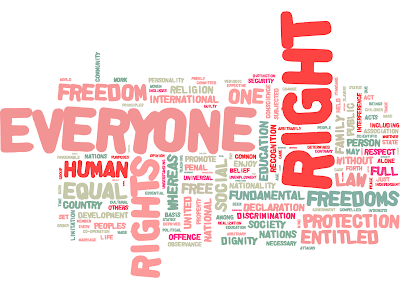Lauren Dziechciarz
Former AmeriCorps Vista, Adult Literacy League
Former AmeriCorps Vista, Adult Literacy League
On this day, December 10th, 1948, at the Palais
de Chaillot in Paris, the Universal Declaration of Human Rights (UDHR) was adopted by
the United Nations. Eleanor Roosevelt was the chair of the committee that
drafted and approved the declaration. After
being added to for the last time in 1976, this document was given the force of
International Law--one of the most highly disputed, highly contested, and
ambiguous types of law that is currently studied. The UDHR came to be after the
atrocities of WWII, and grants a specific set of rights to which all human beings are entitled to by virtue of being human. Hence, the term “Human
Rights.”
Every state (as in country) has signed it, however, there is no absolute way of punishing those who withhold human rights to individuals in their state. Due to this, scholars debate on whether the UDHR has any power.
To which it can be said, that when the Declaration of Independence was written, it was a document of shared beliefs, written to profess, with conviction, that the people of the Americas would no longer tolerate the rule of a monarchy, or taxation without representation. It has become one of the most important documents in American history, not only for what it symbolizes, but what the belief in it helped accomplish.
The Universal Declaration of Human Rights may be considered a lawless document with no powerful way of exacting justice on those leaders that violate it, but it is not worthless to those who believe in the power that it could have one day.
That day will be when a human being in any country is allowed, by his or her leaders, the freedom of speech, the freedom to practice their own religion (without harming others), the freedom to elect their own leader, and the freedom to learn. According to the United Nations Educational, Scientific and Cultural Organization (UNESCO), some 775 million adults around the world lack minimum literacy skills; one in five adults is still not literate and two-thirds of them are women. Approximately 60.7 million children are out of school and many more attend irregularly or drop out.
At the very core of human rights is opportunity. The work that the Adult Literacy League does by providing programs and services to individuals with the lowest literacy skills is vital to our community because all people deserve the opportunity to provide for themselves and their families. They also deserve the opportunity to be productive citizens of the world. Education is the key to this and being able to read and communicate opens the doors to greater opportunities for all who learn.
Every state (as in country) has signed it, however, there is no absolute way of punishing those who withhold human rights to individuals in their state. Due to this, scholars debate on whether the UDHR has any power.
To which it can be said, that when the Declaration of Independence was written, it was a document of shared beliefs, written to profess, with conviction, that the people of the Americas would no longer tolerate the rule of a monarchy, or taxation without representation. It has become one of the most important documents in American history, not only for what it symbolizes, but what the belief in it helped accomplish.
The Universal Declaration of Human Rights may be considered a lawless document with no powerful way of exacting justice on those leaders that violate it, but it is not worthless to those who believe in the power that it could have one day.
That day will be when a human being in any country is allowed, by his or her leaders, the freedom of speech, the freedom to practice their own religion (without harming others), the freedom to elect their own leader, and the freedom to learn. According to the United Nations Educational, Scientific and Cultural Organization (UNESCO), some 775 million adults around the world lack minimum literacy skills; one in five adults is still not literate and two-thirds of them are women. Approximately 60.7 million children are out of school and many more attend irregularly or drop out.
At the very core of human rights is opportunity. The work that the Adult Literacy League does by providing programs and services to individuals with the lowest literacy skills is vital to our community because all people deserve the opportunity to provide for themselves and their families. They also deserve the opportunity to be productive citizens of the world. Education is the key to this and being able to read and communicate opens the doors to greater opportunities for all who learn.



No comments:
Post a Comment